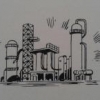Latest Downloads
-
 Water Bath Indirect Heaters
Water Bath Indirect HeatersArt Montemayor - Oct 12 2018 02:35 PM
-
 Petroleum: A Primer for Kansas
Petroleum: A Primer for KansasArt Montemayor - Oct 12 2018 02:27 PM
-
 Spray Tower for Flue Gas Scrubbing Design
Spray Tower for Flue Gas Scrubbing Designankur2061 - May 02 2018 02:31 PM
-
 Selection of Vertical Tanks
Selection of Vertical Tanksankur2061 - Apr 19 2018 07:42 AM
-
 Pressure Drop Calculator for Strainers 1
Pressure Drop Calculator for Strainers 1ankur2061 - Mar 24 2017 02:04 PM
-
 Horizontal Pig Trap System Design Guidelines
Horizontal Pig Trap System Design Guidelinesankur2061 - Jan 14 2017 02:54 PM
-
 Performance Prediction of 3-Stage Propane Refrigeration System
Performance Prediction of 3-Stage Propane Refrigeration Systemankur2061 - Aug 08 2016 02:43 PM
-
 Centrifugal Pump Troubleshooting Checklist
Centrifugal Pump Troubleshooting Checklistankur2061 - Dec 17 2015 08:18 AM
-
 Compressor Troubleshooting Checklist
Compressor Troubleshooting Checklistankur2061 - Sep 08 2015 11:43 AM
-
 Amine Sweetening Unit Preliminary Design
Amine Sweetening Unit Preliminary Designankur2061 - May 19 2015 09:35 AM
Popular Store Titles
 Tank Jacket Calculator
Tank Jacket Calculator
 Specification Sheet Collection
Specification Sheet Collection
 PIPESIZE
PIPESIZE
 Relief Valve Sizing
Relief Valve Sizing
 Rupture Disc Sizing
Rupture Disc Sizing
Chemical and Process Engineering Resources
Submitted Chris Haslego, Nov 21 2011 11:21 AM | Last updated Nov 21 2011 01:29 PM
| Category: | Plant Basics |
| Question: | How can I control the pH level in our cooling water with respect to ammonia contamination? |
| Keywords: | ph,water,ammonia,contamination,cooling,tower |
| Answer: | BACKGROUNDA cooling tower in a urea manufacturing facility is experiencing very high ammonia levels (200 to 300 ppm) in the cooling water. The ammonia level fluctuates with wind direction.RESPONSEIf your cooling water has 200-300 ppm of ammonia, you have a problem which must be solved. You may have a water-cooled process heat exchanger which has a tube leak that is leaking ammonia into your cooling water. Or the ambient air in your urea plant has a significant ammonia content (from various fugitive leak sources such as piping flanges, control valve packing glands, pump and compressor seals, etc.) and when the wind blows that ambient air into the cooling tower, the ammonia is absorbed in the cooling water. In either event, you have an unhealthy situation which must be corrected. Contacting a company that specializes this these types of water treatment problems may be a wise decision (Ex/ Nalco). |
| Links: | Nalcos Homepage |
Forum Quick Links
Tech Q & A Category List
-
 Bulk Solids
Bulk Solids
-
 ChE Outside the Plant
ChE Outside the Plant
-
 Chemical Process Business
Chemical Process Business
-
 Chemistry Basics
Chemistry Basics
-
 Corrosion
Corrosion
-
 Equipment Design
Equipment Design
-
 Experimentation and Testing
Experimentation and Testing
-
 Fluid Dynamics
Fluid Dynamics
-
 Heat Transfer Technology
Heat Transfer Technology
-
 Industrial Utilities
Industrial Utilities
-
 Mass Transfer
Mass Transfer
-
 Physical Property Information
Physical Property Information
-
 Plant Basics
Plant Basics
-
 Plant Economics
Plant Economics
-
 Preparing to Become an Engineer
Preparing to Become an Engineer
-
 Process Control
Process Control
-
 Reactions and Processes
Reactions and Processes
-
 Refining
Refining
-
 Safety
Safety
-
 Separation Technology
Separation Technology
-
 The Environment
The Environment
-
 Thermodynamics
Thermodynamics

 FB
FB



0 Comments